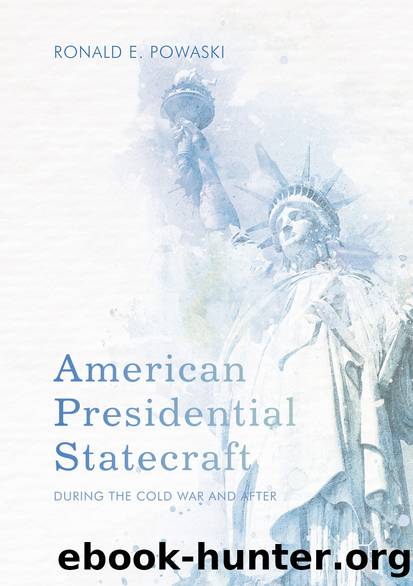American Presidential Statecraft by Ronald E. Powaski

Author:Ronald E. Powaski
Language: eng
Format: epub
Publisher: Springer International Publishing, Cham
The Statecraft of Richard Nixon
Was Nixon a great statesman? He definitely had many of the characteristics of a great statesman. He had acquired considerable knowledge of, and experience with, international relations prior to entering the White House. And he had the statesmanâs ability to think globally, that is, to appreciate that what happens in one country can affect US interests around the world. Moreover with the assistance of Henry Kissinger, Nixon was able to conceptualize grand foreign policy goals as well as the means to achieve them. In so doing, he was able to transcend ideological considerations in dealing with communist countries, including North Vietnam as well as the Soviet Union and China, in order to reach agreements that served Americaâs national interests.
The fact that Nixon succeeded in ending US participation in the war, safely extracting the US ground forces from South Vietnam, and winning the release of American POWs from North Vietnam were no minor achievements. Still, in spite of Nixonâs success in getting the United States out of South Vietnamâor, more accurately, because US military power was withdrawn from South Vietnamâthat country was âlostâ to communism. In so far as the prevention of this outcome had been an important objective of US policy for over two decades, the collapse of South Vietnam has to be considered a major US failure.
To be sure, Nixon, as well as Kissinger, realized that South Vietnam was unlikely to survive without continued US military support. And both accepted the fact that, considering the opposition of Congress and the American people to continued US military involvement in Vietnam, US support would end. What they both sought was a decent interval between US withdrawal and the inevitable demise of South Vietnam. Obviously, they concealed this objective from the Congress and the American people, and then blamed Congress when the inevitable collapse of South Vietnam occurred.
Congressional opposition to the war was a direct consequence of Nixonâs expansion of the war into Laos and Cambodia as well as North Vietnam, at times without the foreknowledge, let alone the consent, of the Congress. His expansion of the war produced a constitutional crisis that culminated in the passage of the War Powers Act, along with congressional legislation terminating funding for US military activities in Indochina.
In addition to undermining congressional support for South Vietnam, Nixonâs approval of the Paris peace agreement also played a major role in bringing about the defeat of South Vietnam. The agreement left over a hundred thousand North Vietnamese troops in the South after the US military withdrawal. Nixon had promised South Vietnamâs president, Nguyen Van Thieu, that he would intervene militarily if North Vietnam violated the agreement. But the Watergate scandal undermined his ability to keep that promise. The scandal helped Nixonâs congressional opponents to shut down US participation in the war.
Watergate, in turn, was partly a by-product of Nixonâs need to maintain public support for the war by discrediting its opponents. But, more fundamentally, it was a direct product of Nixonâs severe character flaws, which ultimately undermined his relationship with Congress and the American people.
Download
This site does not store any files on its server. We only index and link to content provided by other sites. Please contact the content providers to delete copyright contents if any and email us, we'll remove relevant links or contents immediately.
| Elections & Political Process | Ideologies & Doctrines |
| International & World Politics | Political Science |
| Public Affairs & Policy | Specific Topics |
| United States |
The Secret History by Donna Tartt(16675)
The Social Justice Warrior Handbook by Lisa De Pasquale(11495)
Thirteen Reasons Why by Jay Asher(7808)
This Is How You Lose Her by Junot Diaz(5802)
Weapons of Math Destruction by Cathy O'Neil(5055)
Zero to One by Peter Thiel(4840)
The Myth of the Strong Leader by Archie Brown(4796)
Promise Me, Dad by Joe Biden(4460)
Beartown by Fredrik Backman(4442)
How Democracies Die by Steven Levitsky & Daniel Ziblatt(4427)
Stone's Rules by Roger Stone(4426)
The Fire Next Time by James Baldwin(4354)
100 Deadly Skills by Clint Emerson(4091)
A Higher Loyalty: Truth, Lies, and Leadership by James Comey(4044)
Rise and Kill First by Ronen Bergman(4026)
The David Icke Guide to the Global Conspiracy (and how to end it) by David Icke(3899)
The Farm by Tom Rob Smith(3883)
Secrecy World by Jake Bernstein(3792)
The Doomsday Machine by Daniel Ellsberg(3742)
